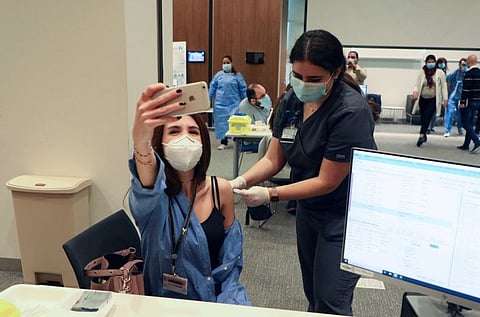Lebanon, despite all odds, begins COVID-19 vaccination drive
Obtains financing of $34m from World Bank to buy doses for 2m people

Beirut: Lebanon began vaccinating its citizens against COVID-19 on Sunday, offering a rare glimmer of hope in a country suffering badly from several overlapping crises, just one of which is the pandemic.
The first shot was administered to the director of the intensive care unit at the lead government hospital fighting the pandemic. The second was given to a famous 93-year-old comedian.
The vaccination drive began after Lebanon received its first batch of 28,500 doses of the Pfizer-BioNTech vaccine. Using $34 million in financing from the World Bank, Lebanon is buying enough doses to vaccinate about 2 million people, roughly one-third of its population. Millions more doses are expected to arrive in the spring and summer through a UN programme and commercial sources.
Lebanon’s worst coronavirus surge peaked in mid-January, when the country was averaging more than 4,800 newly reported cases a day, according to a New York Times database; the average has since fallen somewhat, to about 2,700 a day. Some 337,000 people in Lebanon - almost 5 per cent of the population - are known to have had the virus, and more than 3,900 have died.
To try to drive the numbers down, the government imposed a strict lockdown in mid-January, with a 24-hour curfew and widespread shop closures. It eased the restrictions slightly last week, but the curfew largely remains in effect.
The suffering caused by the pandemic has been compounded by a political crisis that has left Lebanon without an effective government for six months, and a financial crisis that has drastically weakened the local currency, making imported medicines, food and other products more expensive.
A huge explosion in the port of Beirut in August also made matters worse, heavily damaging four hospitals, killing 200 people and leaving thousands more wounded.







